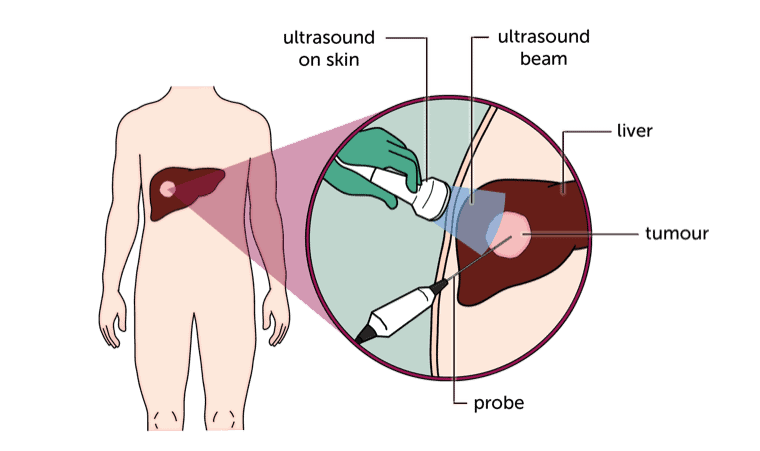This is a local treatment for liver cancer.
What is ablation?
Ablation is a local treatment for liver cancer. Local means it treats a specific area (compared to a ‘systemic’ treatment like chemo, which travels all round the body).
Ablation means to destroy tissue. In liver cancer, this means destroying one or more liver tumours while doing minimal harm to the surrounding healthy liver tissue.
When you might have ablation
You may have this type of treatment:
- to try and cure a liver cancer diagnosed at an early stage
- while you are waiting for a liver transplant, to keep the cancer under control
- to shrink tumours so you can have surgery (doctors call this downstaging)
- to shrink tumours that can’t be removed, to try and control them
Types of ablation
There are two main types of ablation – either using heat or cold to destroy tissue. Using cold is called ‘cryotherapy’ or ‘cryoablation’.
Using heat is more common in treating liver cancers. This is called thermal ablation. There are two ways of doing it. Doctors can use either microwaves or radio waves. Using radio waves is called ‘radiofrequency ablation’. This is usually shortened to ‘RFA’. Microwave ablation is sometimes shortened to ‘MWA’.
Another type of ablation (irreversible electroporation or IRE) uses short pulses of electricity to kill cancer cells without heat. This means your doctor can use it for tumours close to any part of the body that heat could damage, such as the gallbladder or major blood vessels. You may hear it called non-thermal ablation. It’s currently only available in a few centres in the UK. The specialists there would have to look at your medical reports before deciding whether it could help in your case.
How you have thermal ablation
Whichever method your doctor uses, the procedure is much the same. Guided by a scan, the doctor puts an electrode shaped like a needle through the skin and into the liver tumour.
You have this done in the X-ray department or operating theatre. You will either have a general anaesthetic or a sedative and local anaesthetic. Speak to your doctor beforehand if you have strong feelings about which you’d prefer.
Your doctor will ask you not to eat for 4-6 hours beforehand because of the anaesthetic or sedative. Once you are asleep or drowsy, the doctor will use an ultrasound or CT scan to look at your liver and show where they need to put the needle. Once it’s in place, the doctor switches the power on and the needle heats up.

The heat from the needle kills the surrounding cells. The whole thing takes anything from 30 minutes to a couple of hours. The doctor may put the probe in different places if you’re having the treatment for more than one tumour.
Your doctor will ask you to rest in bed for a few hours after treatment. Your nurse will monitor your temperature, pulse and blood pressure. You’ll be able to eat and drink as soon as you’re fully awake. You usually stay in hospital overnight, but will be able to go home the following day.
You may have more than one ablation treatment for liver cancer. If you need more, you’ll have a few weeks break in between. You can also have the same treatment again if your liver tumour grows back.
Side effects of ablation
Side effects of ablation are caused mainly by chemicals being released as cancer breaks down. This usually starts within a day or so of having treatment and last for up to 10 days. Let your doctor know if your side effects go on for longer.
Most people have a raised temperature for a few days afterwards. You may also
- feel sick
- feel very tired
- have pain over your liver, which may spread up into your right shoulder
- have flu-like aches and pains
If you have any other concerns about side effects, contact your hospital. You should let them know if your temperature goes above 38°C, as that could mean you have an infection.
Content last reviewed: October 2022
Next review date: October 2025
